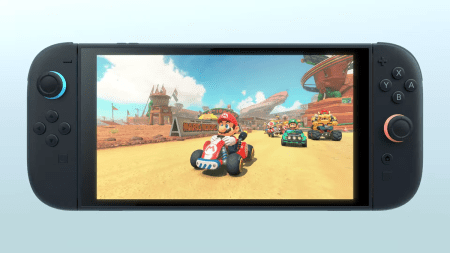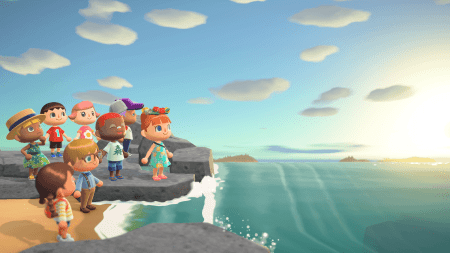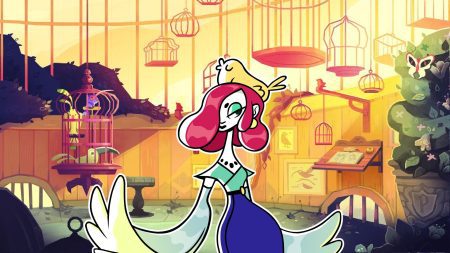A few weeks ago, we received a rather fiery comment on one of our articles. That alone wouldn’t be newsworthy; we’ve seen passionate comments over the years, from rebuttals of our Borderlands game rankings to outcry over leaving Grand Theft Auto off our best PlayStation 2 games list. Still, the critiques we get tend to be tame. Scathing as they can be, they mostly attack opinions, not actual people.
That changed with our Tales of Kenzera: Zau review. A heartfelt piece, published back in May 2024 by Punished Backlog alum (and current VICE writer) Anthony Franklin II, the review delved into the power of grief as a storytelling mechanic. In a particularly stirring passage, Franklin analyzed that grief through the prism of his own life:
There is an argument between Zau and Kalunga midway through the story that made me put the controller down and dry my eyes. I have had that conversation in my head. I’ve said those words out loud. I’ve felt that anger and the immediate, immense sadness that followed them. Abubakar Salim created this world and this story as a way to help himself deal with his father’s passing, but I hope he knows and understands that he has created something that will help many others deal with their own grief. I know it did for me.

Tales of Kenzera, first and foremost, is a game about grief. It is also a game about Black people. Though Franklin mentions both facts in his writing, he gives special weight to the former. It’s what resonated most with him while playing. Sadly, that nuance was all but lost with our commenter, who claimed we awarded the game a high score because “it’s created by someone Black about a character who’s Black, which you enjoy because you’re Black.”
That rant continued for several paragraphs, but the thesis is laid out right there, three times in that sentence alone: Black.
It didn’t matter why our reviewer liked the game. It didn’t matter how much he enjoyed its storytelling, or its world-building, or its combat mechanics. For this random person on the internet, all that mattered was one thing, and one thing alone.
If you’ve followed my recent bylines, you may have noticed a bit of a trend: I can’t seem to “keep politics out of my video games.” Well, folks, I’m tired. Tired of listening to capital-g Gamers push an anti-woke agenda. Tired of losers like Asmongold and Grummz who grift for no reason other than that they feel threatened by people who have the audacity to exist.
Most important, I’m tired of this argument that there’s more than enough diversity in video games. DEI might be the patsy of a post-Trump, post-Elon America, but here’s the truth: Diversity, equity, and inclusion benefits us all.

Back to the Prompt
If I did my job right, I pulled you in with the evocative headline. “DEI in my Mario Kart?! This guy’s smoking something fierce!”
Stay with me for a second. Take a moment to think back on the last game of Kart you played. Perhaps it was with a group of tight-knit friends, snowed in after school; or at a college party, in a corner, away from the temptations of another pot brownie or beer; or, better yet, with some plaid-patterned, polo-wearing engineers at your tech think tank on a random Friday night, interspersed between conversations of OKRs and KPIs.
The point is, Mario Kart has been a fixture of nearly every player’s childhood, teenhood, and adulthood. It is gaming distilled down to its very essence: Play, win some, lose some, but always have fun.
Now think back to the last time you got blue-shelled in Mario Kart. Probably felt awful. After all, you’d worked for first place. Odds are, you’re fairly accustomed to the game. You’re used to its patterns, perhaps taught its intricacies by a parent, or a friend, or someone else with influence or skill. Losing your chance at victory sucks, plain and simple. Especially when someone less deserving overtakes you and makes their way to the finish line.
Wish you could scream at that person who shelled you, right? If it wasn’t just a game, the idea of a last-minute equalizer would only make your blood boil more, wouldn’t it?
Well, I have a hypothesis, dear reader. The people who back Trump, and Musk, and RFK, and Rubio, are convinced that the blue shell exists in real life. They believe, wholeheartedly, that DEI is the equivalent of Mario Kart’s most infamous power-up: something designed to help people behind you in life get ahead of you, often with no actual effort at all—just pure luck.

The Truth About DEI
Here’s the thing about the truth. It hurts because it’s scary, and because it’s often not what we want to hear. But that doesn’t make the truth any less important, or any less true.
The truth is this: DEI is not the blue shell in Mario Kart. If anything, it’s the Bullet Bill.
Think about the frustrations you’ve encountered while trying (and failing) to dodge the blue shell. Now think about the Bullet Bill—an item designed to help the person in 11th or 12th make their way to, at best, 7th or 8th place. That silver (well, black, but roll with it) bullet isn’t magic; it doesn’t somehow win you the race or catapult you from last to first. All it does is keep you competitive. It gives you an actual shot of coming out on top, or at the very least not getting lapped by those already far ahead.
For decades, conservatives have painted DEI as an undeserved handout for minorities looking to get a free ride. Affirmative action was viewed as a rejection of merit-based selection. Diversity commitments at companies like Facebook and Google were intentionally misconstrued as check-the-box quotas. The prevailing notion was that if a Black, or brown, or female-presenting person was given the job, it was because they were less deserving than those who “actually worked for it.”
Now, amid the most turbulent presidential term of our lifetimes, we’re seeing DEI under siege. The quiet part is no longer being muttered; it’s being shouted from every Nazi-saluting, flag-bearing, warmongering corner of the internet. Just the mere concept of diversity has become the scapegoat for a plane crash that didn’t involve a single Black pilot. It’s no longer a question of whether or not you worked for it; it’s now a question of whether or not you’re white enough to pass this ridiculous purity test.

Let’s Stop the Charade
Why the Mario Kart analogy? This is a gaming site. Video games are some of what I know best, and they give me comfort during these crazy times. Even still, I also know that there’s truth in fiction, and in escapism. Mario Kart might be a fun, simple game we play while blitzed off a few hits of Smirnoff, but it’s also an oddly accurate portrayal of our current predicament.
If you happen to be anti-woke and read our site (odd Venn diagram, but hey, it’s possible), let me put it in the simplest terms I know: DEI is not your enemy. Diversity, equity, and inclusion are not taboo words. If you enjoy fighting games where every character is balanced, where every character is viable, where there’s a path to victory whether you’re Richter Belmont or King K. Rool, you believe in equity. If you value games that break away from the live-service mold, that dare to do something different, be bold, be unique—you believe in diversity. And if you hate that damned blue shell but love a well-timed Bullet Bill or golden mushroom, then I’ve got some tough love: You’ve got the wrong target in your sights.
Helping someone up when they’ve fallen down is just being a decent human. Backstabbing someone from behind to take their spot is what Donald Trump has been doing his entire life.
David is the founder of The Punished Backlog. He has a problem finishing games he starts.
Just beat: Hollow Knight: Silksong.
Working on: Yakuza 0, Iconoclasts, Metroid Prime 4: Beyond.
Can't wait for: Demon Tides.
Follow David on Twitter at @David_Silbert to keep up to date with all things The Punished Backlog.












Hey David, you’re incoherent about all this. I’m middle-aged and have been disadvantaged my entire life as a white male (never mind that I’m actually a card-carrying native american). Please try to take a breath before you call me a nazi, even if just internally, because I can understand why someone might not be a big fan of DEI. Maybe we could just play a video game without checking the genitals?
You’re not getting it, my guy. Why would I call just anyone a Nazi? You’re projecting.
If you’re an actual native American, then you should understand the plight of having your land, your people, and your autonomy stripped away from you. Sounds like you’re just trying to troll in bad faith.
Your last sentence is laughable. Formulate an actual argument before you critique.